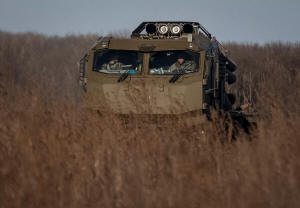Ukraine says Russia pulls back forces from river towns opposite Kherson
 Send a link to a friend
Send a link to a friend
 [December 01, 2022]
By Tom Balmforth [December 01, 2022]
By Tom Balmforth
KYIV (Reuters) -Ukraine's military said on Thursday Russia had pulled
some troops from towns on the opposite bank of the Dnipro River from
Kherson city, the first official Ukrainian report of a Russian
withdrawal on what is now the main front line in the south.
The statement gave only limited details and made no mention of any
Ukrainian forces having crossed the Dnipro. Ukrainian officials also
stressed that Russia had intensified shelling across the river, knocking
out power again in Kherson where electricity had only begun to be
restored nearly three weeks after Russian troops vacated the city and
fled across the river.
Since Russia abandoned Kherson last month, nine months into its invasion
of Ukraine, the river now forms the entire southern stretch of the
front.
Russia has already told civilians to leave towns within 15 km of the
river and withdrew its civilian administration from the city of Nova
Kakhovska on the river bank. Ukrainian officials have previously said
Russia pulled back some artillery near the river to safer positions
further away, but until now had stopped short of saying Russian forces
were quitting towns.
"A decrease in the number of Russian soldiers and military equipment is
observed in the settlement of Oleshky," the military said, referring to
the town opposite Kherson city, on the far side of a destroyed bridge
over the Dnipro.

"Enemy troops were withdrawn from certain settlements of the Kherson
oblast and dispersed in forest strips along the section of the Oleshky -
Hola Prystan highway," it said, referring to a 25-km (15-mile) stretch
of road through riverside towns scattered in woods on the bank opposite
Kherson city.
It said most of the Russian troops in the area are recently mobilised
reservists, suggesting that Moscow's best-trained professional troops
had already left the area.
Reuters could not independently confirm the report.
Separately, Ukraine tightened security at its diplomatic missions around
the world on Thursday after a mail bomb exploded at its embassy in
Madrid, one of several devices sent to targets in Spain, including to
Prime Minister Pedro Sanchez.
Ambassador Serhii Pohoreltsev told the Ukrainian news site European
Pravda that the suspicious package addressed to him had been opened
outside the building by the embassy's Ukrainian commandant, who was
injured in the blast.
"After opening the box and hearing a click that followed, he tossed it
and then heard the explosion," he said. "Despite not holding the box at
the time of the explosion, the commandant hurt his hands and received a
concussion."
BATTLEGROUND
The Ukraine war is entering a relentless new phase with the onset of the
first winter since Russia's Feb. 24 invasion.
After withdrawing in the south in November, Moscow has focused its
firepower on a section of the front line in the east near the city of
Bakhmut, where hundreds of soldiers are thought to be dying a day in
some of the conflict's bloodiest fighting, yielding little reported
gains of territory on either side.
[to top of second column]
|

Ukrainian servicemen prepare fire with a
Bureviy multiple launch rocket system at a position in Donetsk
region, as Russia's attack on Ukraine continues, Ukraine November
29, 2022. Radio Free Europe/Radio Liberty/Serhii Nuzhnenko via
REUTERS

Ukraine's armed forces reported heavy shelling of a number of
frontline cities in the area.
"We are analysing the intentions of the occupiers and preparing
counter-measures - tougher counter-measures than is now the case,"
President Volodymyr Zelenskiy said in an overnight televised
address.
Denis Pushilin, head of the Russian-installed administration in
occupied parts of Donetsk province, said a prisoner exchange was
expected to take place later on Thursday, with the sides each
releasing 50 prisoners.
There are no political talks under way to end the war, which Russia
launched as a "special military operation" claiming its aim was to
disarm its neighbour and root out leaders it characterises as
dangerous nationalists. Kyiv and the West call it an imperialist
land grab that has killed tens of thousands of Ukrainian civilians
and soldiers on both sides.
Since early October, Russia has also launched near weekly massive
missile and drone attacks across Ukraine to knock out its power
supply, water and heat, which Kyiv and the West say is intended to
harm civilians, a war crime.
Russian Foreign Minister Sergei Lavrov defended those strikes on
Thursday, saying Moscow was targeting Ukraine's civilian
infrastructure to prevent Kyiv from importing Western weapons. He
did not explain how such attacks could achieve that aim.
"We disable energy facilities (in Ukraine) that allow you (the West)
to pump lethal weapons into Ukraine to kill Russians," Lavrov said.
The European Union called this week for a special tribunal to
prosecute Russian officials accused of aggression, the war crime of
attacking another state without justification. The Kremlin rejected
this on Thursday.
"As for attempts to establish some kind of tribunal: they will have
no legitimacy, will not be accepted by us and we will condemn them,"
Kremlin Spokesman Dmitry Peskov said in a briefing call with
reporters.
Ukraine's nuclear power company said on Thursday it had sacked a
senior engineer at the Zaporizhzhia nuclear power plant for
collaborating with Russia, a day after Moscow said the engineer,
Yuriy Chernichuk, was promoted to become the plant's new boss.

In October, Russia said it was taking control of the plant, which is
located in Russian-held territory along the Dnipro but still
operated by Ukrainian engineers. Kyiv says the plant still belongs
to Ukraine and Russia's seizure of it is illegal.
(Reporting by Reuters bureaux; writing by Stephen Coates and Peter
Graff; editing by Mark Heinrich)
[© 2022 Thomson Reuters. All rights
reserved.]
This material may not be published,
broadcast, rewritten or redistributed.
Thompson Reuters is solely responsible for this content. |